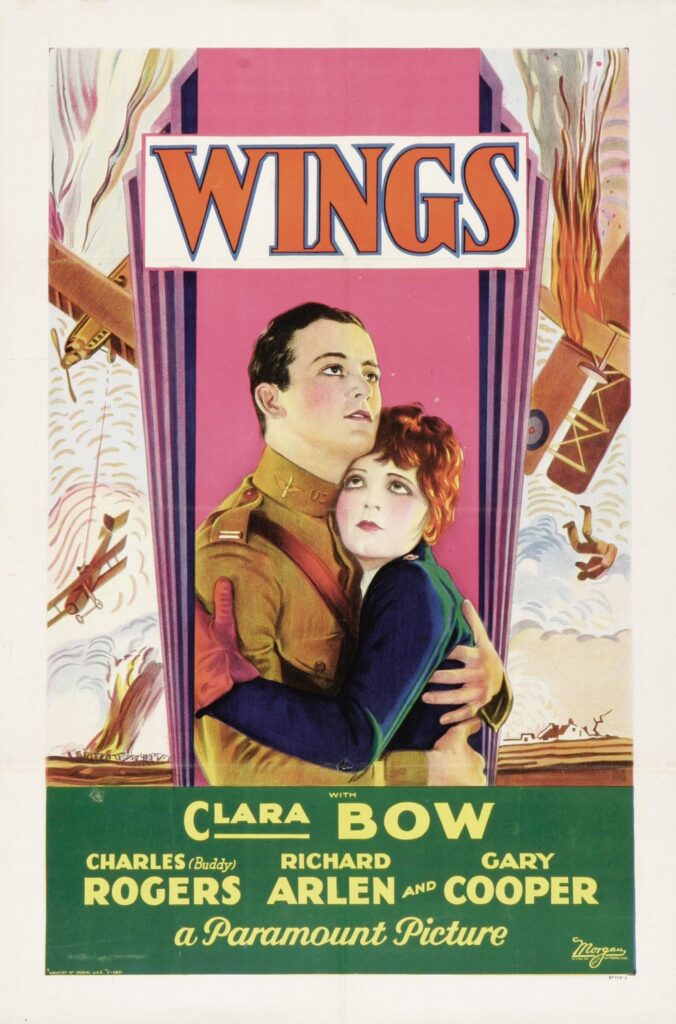
Filmed in the span of just nine months, Wings is a 1927 American film (although it wasn’t actually released in the U.S. until 1929), directed by former WWI aviator, William A. Wellman, and starring Richard Arlen (also a former aviator in the War), Charles Rogers, and Clara Bow—Paramount’s bona fide ‘IT Girl’ and star with a big, glittery capital ‘S’.
The film is a romantic war drama, telling the story of two men: Jack Powell (Rogers) and David Armstrong (Arlen). Both men are from notably different walks of life: Jack is a middle class idealist with a dream of flying, while David is the son of the richest family in town and seems far more down to earth—really, the only thing the boys have in common outside of their decision to enlist in the War is their rivalry for the affections of the beautiful city girl, Sylvia Lewis (Jobyna Ralston). Meanwhile, Jack is painfully oblivious to the affections thrown his way by his friend and literal girl next door, spunky and doe-eyed Mary Preston (Bow). As 1917 closes in, both Jack and David enlist in the army to become aviator pilots and are billeted together and, following the sudden death of their tentmate and having undergone intense military training together, the two’s rivalry fizzles out into the gritty but affectionate friendship that sometimes borders on intimate as the war drags on, a relationship which feels all too familiar and tragic in this class. Meanwhile, Mary decides to enlist in the Women’s Motor Corps of America as an ambulance driver—and well…fate finds a way.
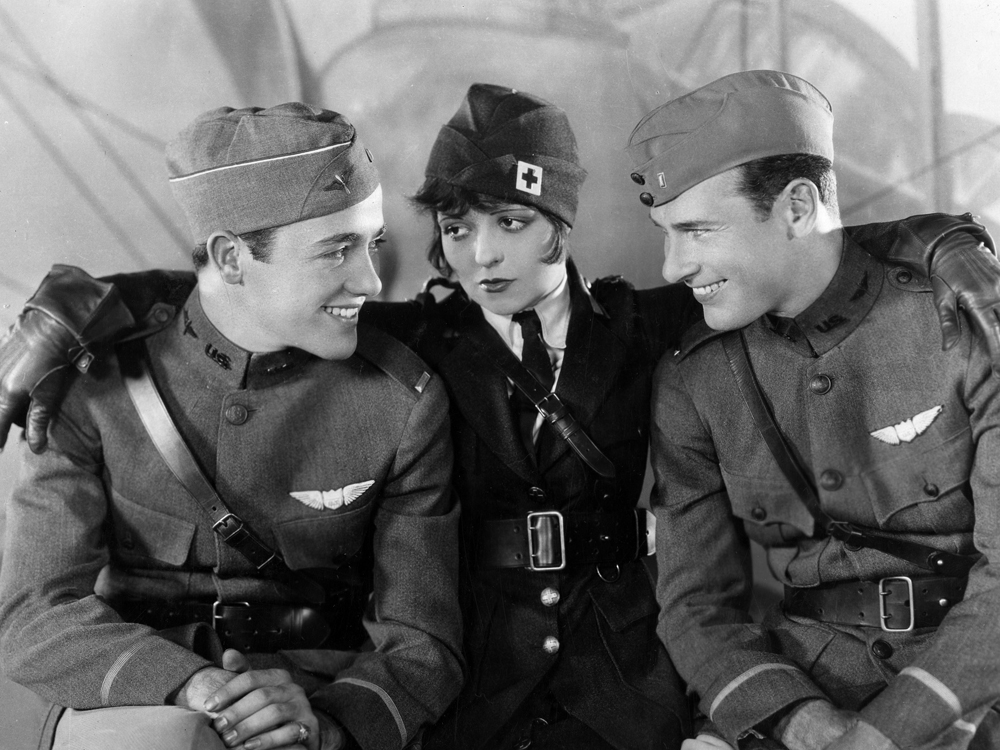
This film initially caught my attention on two factors: 1) it was just barely before All Quiet at the Western Front in the US (and completed two years prior), and I was curious on its portrayal of the War—would it condemn it or glamorize it, in its retrospective approach?; and 2) as a silent film (sans the music cues and SEX added in the 2012 restoration by Paramount), it mostly relies pretty much solely the expressions and body language of the actors alongside the cinematography to tell its story, as you can’t just type out every little line of the script on title cards and call it a day. Considering how much we have read in class from the POVs of characters who have mostly internalized everything to the point of coming off as notably detached, could the exaggerated and expressive style that is practically necessary for silent films work in a film about the Great War? Thankfully, both of these questions were answered in a way that I felt was satisfying.
Right off the bat, the cinematography is nothing to scoff at: even a shot as simple as David and Sylvie lazily swinging in a hammock together is poignant as the camera literally swings along with them, back and forth, before the sudden arrival of an excited Jack literally jolts their idyllic scene to an abrupt halt. Likewise, there’s an equally stunning dolly zoom later on in the film in which we glide past all the gleeful patrons of a French nightclub drinking and petting before we land on a happy and shamelessly intoxicated Jack. However, the moments that will surely stand out—even in the somewhat drag of a first act—are the aviation and dogfighting scenes, among the first of their kind, and just as enthralling today as they were almost a hundred years ago. Additionally, there are little animations added here and there such as the bubbles that occupy Jack’s hazy mind during his drunk stint on leave in Paris halfway through the film, as well as in the title cards, that are a nice touch.
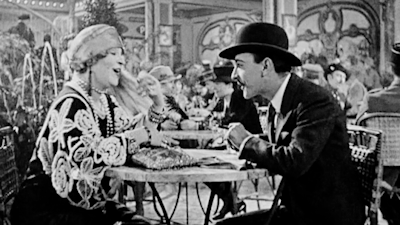
Many of the texts we’ve read have emphasized the dangers of individuality and how people were stripped of it during the War—here, we have a clearly defined protagonist in the primary POV character, naive Jack Powell. Moreover, the film early on, almost takes on the jovial, patriotic tone that one would more likely see on propaganda posters than on the actual Front; much lime we have a clearly defined “hero”, we have our established villain: German ace pilot Count von Kellermann and his dreaded “Flying Circus” who, among ominous closes ups of the Iron Crosses on their black planes and shots of the pilots giggling and twirling their mustaches as they bomb compounds with glee, are accompanied by a score that seems more suitable for a Star Wars villain. Likewise, the emphasis on comradery amongst the Allied forces is paramount—the British soldiers gleefully rescue Jack went he’s down and cornered by German gunfire, eagerly ushering him into their trench with wide smiles on their faces—”chivalry of the knights of air”, the movie calls it. There’s even a comic relief character, a Dutchman named Herman Schwimpf, whose entire schtick is that he is blissfully and shamelessly patriotic to the point of getting an American flag tattooed on his bicep to wave as his superiors continuously try and fail to literally knock sense into him.
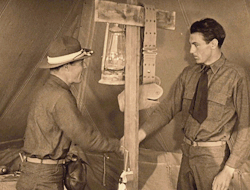
Yet, despite the somewhat light tone starting out, there are notable undercurrents of things not being so great about the Great War: kicking off with the almost immediate and senseless death of Jack and David’s would-be tentmate, Cadet White, before we even have the chance to get attached. Likewise, a fairly comedic scene of Jack’s fun drunk antics in Paris and Mary’s attempts to get him to leave with her to get him back to his post (and away from the French girl he’s been cozy with) is under the threat of him being court martialed, and ends with the painful double whammy of Mary both realizing Jack is in love with Sylvia and then being fired from her job when military police catch her undressing from a gown she used to infiltrate the nightclub, and assume the worst.
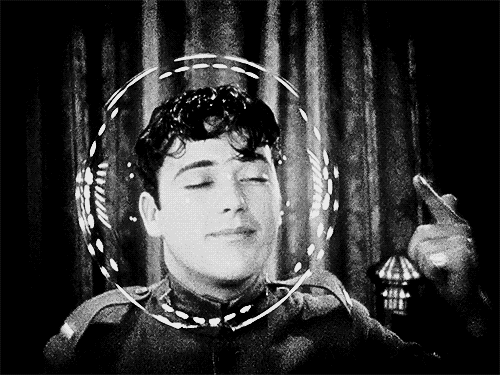
It all goes downhill following her abrupt exit, as we are thrown headfirst into the War again with scenes that are, while not very explicitly bloody, are just as intense—from a random soldier getting struck down with shrapnel from a bombing in the Front, to another soldier being crushed by a falling tank, its made abundantly clear that this film, while a romance, is anything but romantic down to its roots. When Jack and David’s relationship gets tested following a misunderstanding, and David is later shot down by the enemy in the following dogfight, Jack makes it a point to brand himself the hero and avenge his fallen friend by taking down as many Germans as he can. Little does he know, David is still alive in German territory, and manages to escape by stealing a German plane. Oh, oh no…
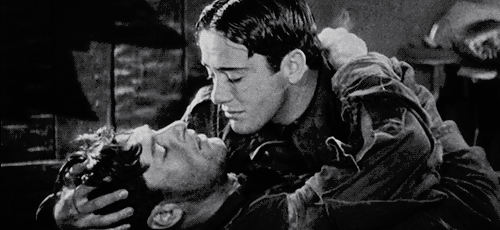
Jack’s stint at heroism ends with a sharp role reversal as he is given tube villainous music cues as he tries to chase and strike down David, believing he’s “only another foe to be slaughtered without mercy”. When he eventually succeeds, he’s finally broken when he realizes his fatal mistake, much like Paul and the French soldier, only this time, he has a grieving family he has to go back to. Rogers and Arlen’s acting in this scene is excellent, and we even cross that blurred line of the friend, brother, and the lover so common in the bonds between soldiers at the time, leading up to arguably the most famed scene of the film nowadays: Jack passionately kissing David on the lips as the latter dies in his arms. And although Jack goes home a celebrated “hero” (to the point of literally having his name and face plastered on newspapers that laud him as such) and is publically showered with adoration and flowery parade rides through town, there’s a distinct emptiness as he looks at the little bear charm David left behind—the one Jack promised to return to his mother. Furthermore, the ending scene between Jack and David’s mother makes the message obvious: “I—I wanted to hate you, John, but I can’t. It wasn’t your fault. It was—war!”
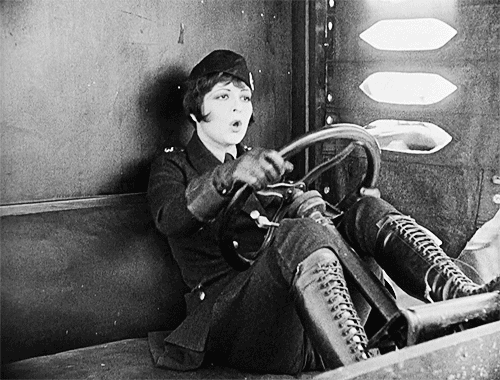
Overall, I really enjoyed this film despite its slow start, and would recommend it even if you don’t like silent films. The acting and the action is excellent, and it really feels like gradually watching characters like Paul get to the point of where they were in their story fresh from their idealistic beginnings—under a less overly violent, nihilistic lens. I can see why this won the Academy Award for Best Picture. My only real complaint is that Mary did NOT deserve Jack—at all.
